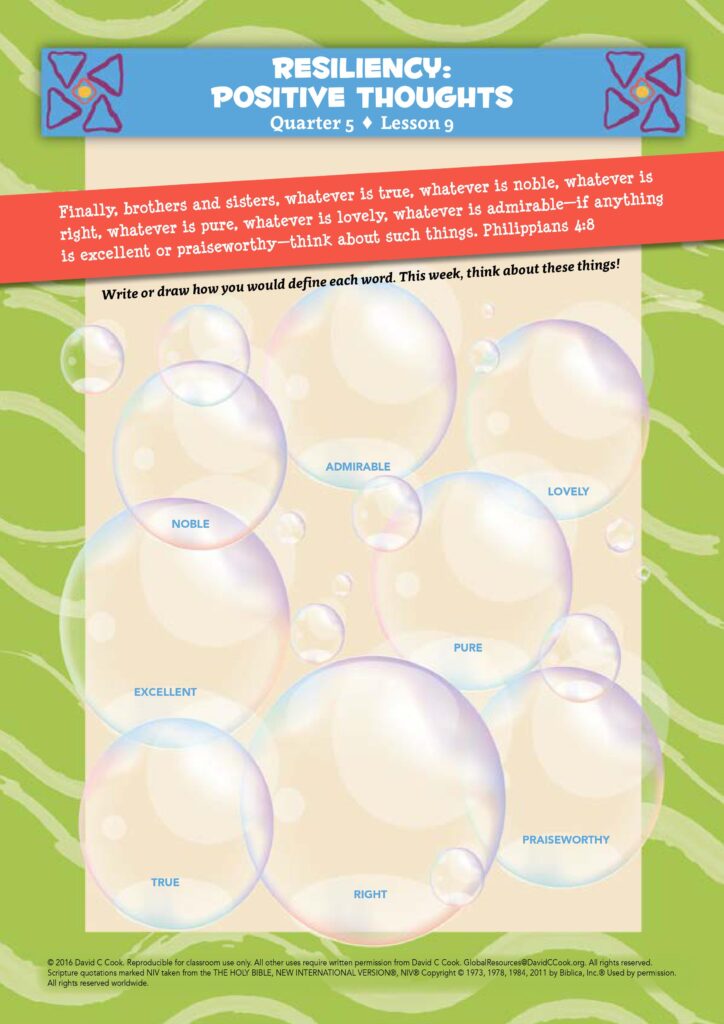During the lesson, the information for you to know is written in regular type, and what we suggest speaking or reading aloud to children is in bold. All resources for this lesson, including the Teacher Guide, Student Page, Family Connection Card, and other resources can be downloaded in a ZIP file by clicking on the following link:
In some lessons you will find "resource articles." These are articles written by experts from around the world to help equip you for your work with children and adolescents. Share them with parents or guardians if you consider it appropriate.
Unit Introduction: For the next few weeks, you will help the children learn about resiliency. Resilience is the ability to keep going when life is hard. These life-skills lessons are especially important for children whose lives are hard and unpredictable. Children who experience abuse, live in poverty or do not have supportive families are at higher risk for negative, self-harming behaviours. These lessons will give children specific, positive strategies for dealing with difficult times. Pray that God’s Spirit will use these lessons to transform children’s hearts and lives!
Finally, brothers and sisters, whatever is true, whatever is noble, whatever is right, whatever is pure, whatever is lovely, whatever is admirable— if anything is excellent or praiseworthy—think about such things.
Philippians 4:8
Our thoughts are powerful. They affect our attitudes, actions, and moods. Our thoughts reflect the condition of our hearts. When you experience something difficult, what thoughts fill your mind? Do you worry about everything that could go wrong? Does your heart fill with anger as you think about the people who have wronged you?
The apostle Paul encouraged all believers to “take captive every thought to make it obedient to Christ” (2 Corinthians 10:5). One way to take your thoughts captive is to replace negative thoughts with positive ones. This week, dwell on each of the words from Philippians 4:8. Make a list of things that are true, noble, right, pure, lovely, admirable, excellent, and praiseworthy. Then think about those things.
Let your families know the next few weeks you will teach about resiliency, or the ability to remain strong and keep going during hard times. This week children will learn to think about positive things. Families can practice positive thinking by sharing good things every day.
Teacher Tip: If possible, email or text the Family Connection Card to the families of your students.
Greet your children warmly as they arrive. If any children started honesty journals last week, ask if they were surprised by what they noticed.
For the next few weeks we will learn about something called resiliency. This means you can bounce back when difficult things happen. It means you keep going when life is hard.
Small, fragile plants can break and die in a storm. Big, strong trees may bend or suffer damage, but they usually do not die in a storm.
Today we will learn that thinking positive thoughts can help us be resilient. The ability to think about good things instead of scary or bad things helps us deal with hard times. Let’s do an activity about positive and negative thoughts.
Let’s close our eyes and imagine there is a terrible green monster. It has ugly brown eyes and a slimy mouth with sharp teeth. It is huge and scary.
Now, everyone stop thinking of the monster. Just put that big green monster out of your mind. Do not think about his sharp teeth. Just stop thinking about it. (Pause for 5 seconds.) Raise your hand if you have stopped thinking about it.
Thank you. You can put your hands down. Now with your eyes still closed, imagine several beautiful butterflies in a lovely garden. They are flitting around and look so pretty. You watch them land on a flower right in front of you. Raise your hand if you have stopped thinking about the monster.
Open your eyes now. When you wanted to stop thinking about the monster the first time I asked, it wasn’t easy, was it? When you started thinking about the butterflies, it was easier to stop thinking about the monster.
When you have sad, depressing, or scary thoughts in your mind, you can help get rid of them by thinking good, happy thoughts.
Let’s read a Bible verse that tells us what kinds of things God wants us to think about.
Show the Memory Verse poster if you are using it.
Finally, brothers and sisters, whatever is true, whatever is noble, whatever is right, whatever is pure, whatever is lovely, whatever is admirable— if anything is excellent or praiseworthy—think about such things.
Philippians 4:8

This verse is full of many wonderful words! Let’s figure out what those words mean. According to the verse, we need to think about things that are true.
The children might mention that God himself is true. They might mention God’s love, our love for others, God’s goodness, etc. help the children if needed.
Things that are true are not based on lies. They are real.
Optional Supplies: Draw 8 big circles on the board or on a large piece of paper. Write TRUE inside 1 circle. Write the children’s responses inside the circle. Repeat with the other words from the verse.
Ask the same question for each of the other words in the Bible verse. Some of these words have similar meanings. Share the definition of each word after the children have responded.
Noble means honourable and worthy of respect.
Right means consistent with God’s Word, appropriate.
Pure means wholesome, not having to do with sin.
Lovely means something that brings peace, is friendly and lovable.
Admirable means well spoken of, a good example to follow.
Excellent means outstanding, the highest quality.
Praiseworthy means commendable, deserving of praise.
Optional: if you are using the Student Pages, there is space for children to write or draw things that represent each of the words in Philippians 4:8.

This verse tells us to think about the best, not the worst. We should think about what is beautiful, not ugly, and what is honest, not dishonest.
This verse is in a letter that was written to encourage the Christians in the city of Philippi. There were many slaves and poor people in that city. There were a lot of sad and difficult things for this group of Christians to think about.
Allow children to share their ideas. Remind them of the imagination game they did at the beginning of class. If you have a specific example from your life, share it.
Your thoughts are very powerful! When you think about positive things, it changes the way you see a situation. It can change your attitudes and your actions. When you are sad or scared and cannot think of anything positive, think about God. Positive thoughts come from knowing the truth about who God is and how He sees you.
Thinking positive thoughts helps us to be resilient in hard times, like a big, strong tree in a storm.
If we begin thinking about good things, we can get rid of the bad thoughts. Here are three examples:
1. If you want to stop worrying about your sister’s health, think about how good God is and how He cares about her.
2. If you want to get rid of your fear of the dark, memorize verses about not being afraid. You can recite those verses yourself every time you are afraid.
Your students can memorize Isaiah 41:10 and John 14:27. Read them to the children from your Bible.
So do not fear, for I am with you; do not be dismayed, for I am your God. I will strengthen you and help you; I will uphold you with my righteous right hand.
Isaiah 41:10
Peace I leave with you; my peace I give you. I do not give to you as the world gives. Do not let your hearts be troubled and do not be afraid.
John 14:27
3. If you want to get rid of anger about how someone has hurt you, pray for that person.
Now, let’s practice doing this.
Divide the children into two groups. Someone in the first group will suggest a situation where they have negative thoughts. The second group can shout out positive things that can help to get rid of the negative thoughts. Then reverse which group suggests the situation and which shouts out positive things. Do this several times.
Close class by praying this blessing based on Philippians 4:8–9:
Blessing: Children, whatever is true, noble, right, pure, lovely, admirable—things that are excellent or praiseworthy—think about such things. And the God of peace will be with you.
Lead the students in singing this quarter’s song, if possible.
Life on Life ©2020 David C Cook. Reproducible for home or classroom use only. All other uses require written permission from David C Cook [email protected]. All rights reserved.